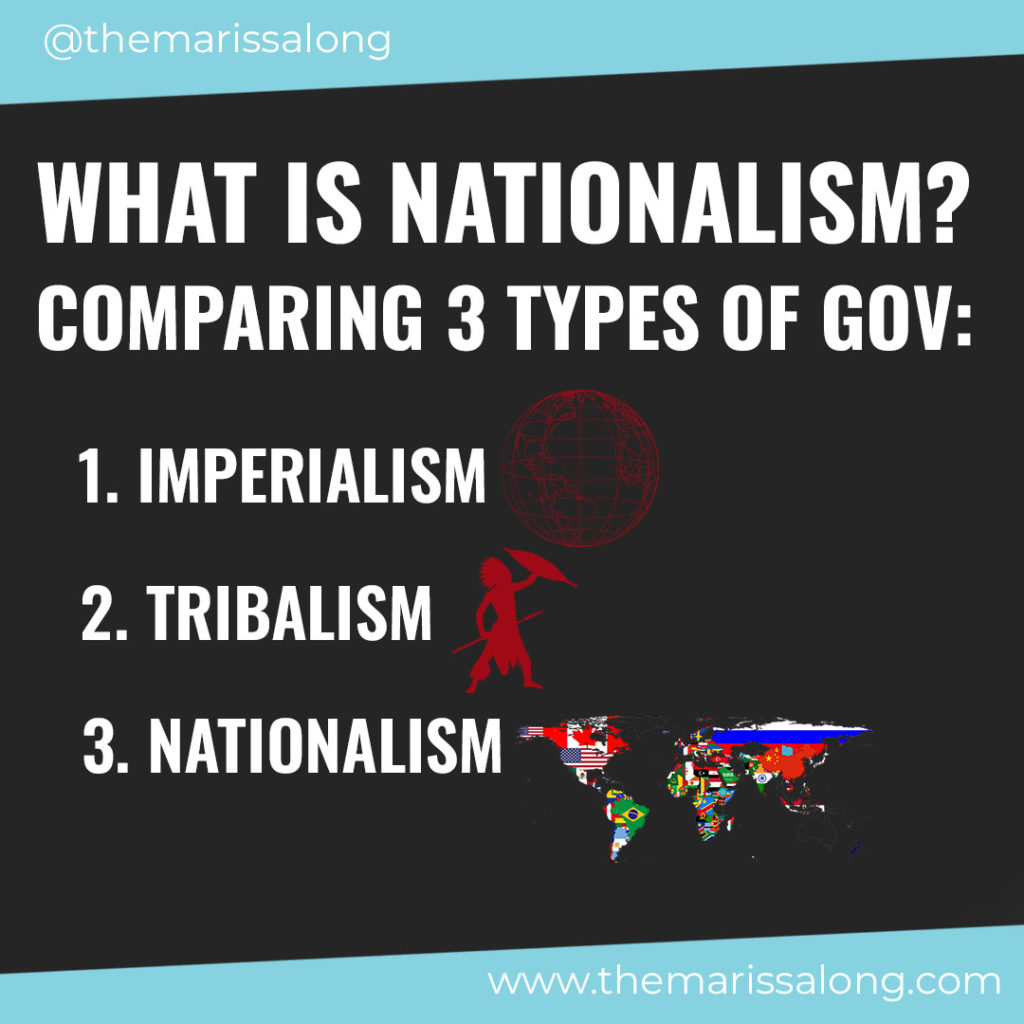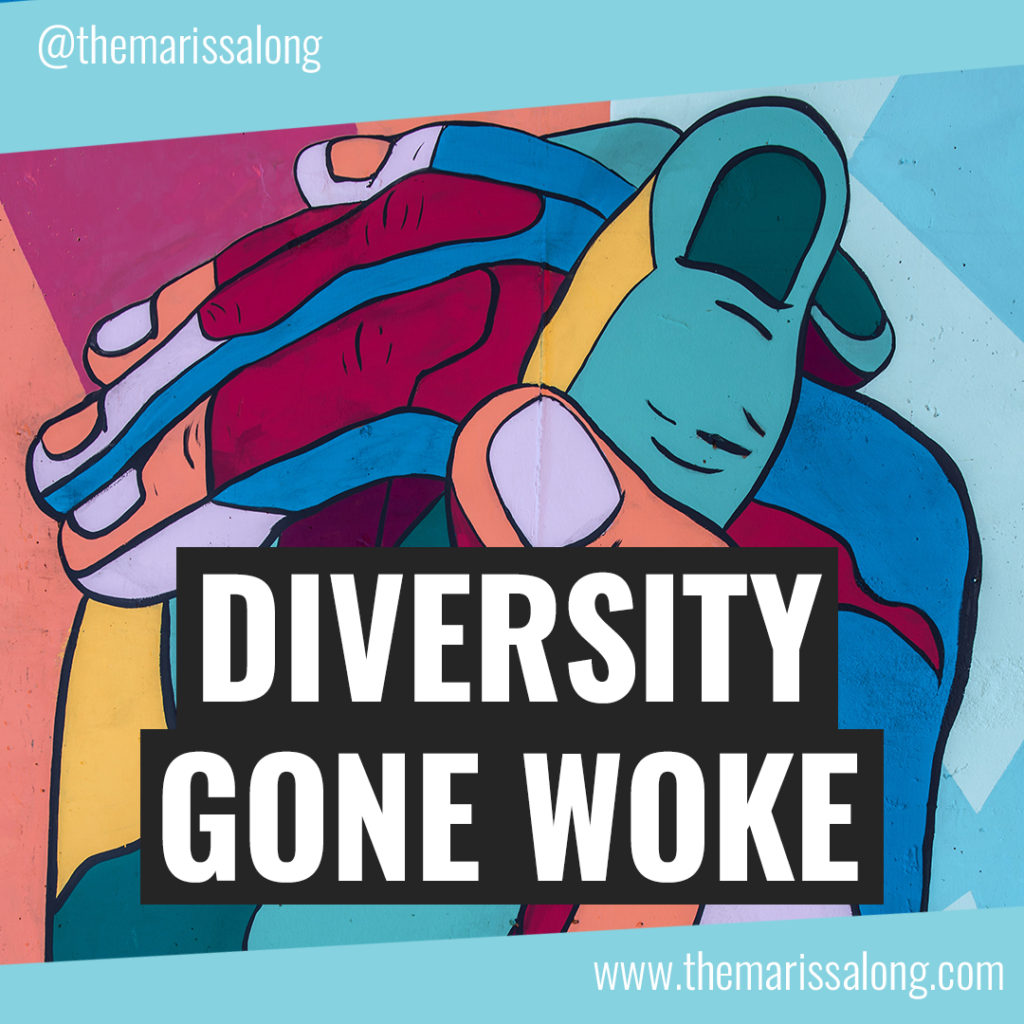What is nationalism, and how does it compare to imperialism and tribalism – two other prominent forms of government? Not every aspect of nationalism is healthy, but we can’t throw the baby out with the bath water.
Christian nationalism, on the other hand, is blamed for everything when a conservative holds a public (political) office. We have been faithfully taught in church to sit down and shut up when it comes to politics, and if a Christian dares to step out of bounds and actually run for office, they might get a few pats on the back at church, but in the political arena, they’ll get slaughtered with the slurs of Christian nationalism, racism, and fascism.
In Part 1 of this series, we looked at Christian nationalism. How does the world define Christian nationalism? How should Christians define Christian nationalism? And is Christian nationalism really all that bad if we put it back into its original context?
Now we’re diving into three forms of government (imperialism, tribalism, and nationalism) and why nationalism holds some virtues that the others do not. After all, the polar opposite of nationalism is globalism, and do we really want that as much as our rulers say we do?
Read Part 1: Debunking the Myth of Christian Nationalism
The Three Types of Government
The three types of government we’re studying are (1) imperialism, (2) tribalism, and (3) nationalism. These forms of government have been around pretty much since the beginning of earth and human rulers, so let’s dive in.
1. Imperialism
Imperialism is defined as “the policy, practice, or advocacy of extending the power and dominion of a nation especially by direct territorial acquisitions or by gaining indirect control over the political or economic life of other areas” (Merriam-Webster Dictionary).
The Spanish Conquistadors imperialized Central and South America in the 16th century, and Great Britain was practicing imperialism when it established colonies and forced English ways on indigenous people in Australia, India, and South Africa.
It’s important to distinguish imperialism from colonialism, although the two are closely linked. “In essence, colonialism is the physical practice of global expansion, while imperialism is the idea that drives this practice” (ThoughtCo).
Imperialism also leads toward socialism and monopolies in industry (think Big Tech), and it can reduce the market competition that is so characteristic of capitalism.
2. Tribalism
Tribalism is the second form of government after imperialism. It’s somewhat self-explanatory since it is “tribal consciousness […] or strong in-group loyalty” (Merriam-Webster Dictionary). It “relies on ties of blood, creed or conquest to unite citizens around a common goal” (The Stream). Tribalism is dependent on what culture you grow up in, but tribalism is not made up of just native ties. It can also include ideologies.
This is especially evident with critical theory in America as people divide into groups based on gender, skin color, weight, etc., and these people are loyal to the group in which they fall.
“This new form of American tribalism is often based on shared offenses. All those offended by the same thing rally together to shout at everyone else who is deemed ‘part of the problem.’ The result is that the flag is disrespected, American history is reinterpreted, and national cohesion is all but lost” (Got Questions).
A tribalistic government is often exclusive and does not really allow anyone else in to the tribe. Tribalism also has a tendency to leave people with “unguarded property rights, rampant theft and devastated ‘commons’” because no one owns anything in a communal society (The Stream).
3. Nationalism
And finally, we look at the third form of government: nationalism, the boogeyman of American politics. Piggy-backing on part 1 of this series, nationalism is defined as “loyalty and devotion to a nation, […] a sense of national consciousness, […] exalting one nation above all others and placing the primary emphasis on promotion of its culture and interests as opposed to those of other nations […]” (Merriam-Webster Dictionary).
As with anything else, nationalism can be twisted and misused, but the good side of nationalism is its tendency to reduce “the constant conflict among competing tribes” but still allow religions, political ideologies, and cultures to maintain their individuality and diversity (in its original sense).
Original Definitions: Diversity Gone Woke
Nationalism is capitalism’s best friend because of the competition it allows in both markets and cultures. America, which is obviously capitalist and has many characteristics of nationalism, has allowed political immigrants to find hope on its shores. People can try new things, learn the market, and swim with the big dogs.
An Analysis of Nationalism
Nationalism isn’t just about loving your country and being loyal to it. It allows the economy to boom, it gives people job opportunities since employers accept the person most qualified for the job (rather than the person from their tribe), and it makes a nation strong since its citizens love and support it and will buy its products rather than a foreign-made product.
Look at America and its form of government. We are first of all a republic since we are too big for a democracy (in a democracy, all people must be present to vote, whereas in a republic, you can send representatives). We are limited government due to the three branches of government. We are all about equality and freedom. And America’s first goal was to shine the light of freedom to oppressed people and nations and to welcome legal immigrants to enter America through a set process. We were incredibly patriotic, especially after the Revolution and then after the World Wars. America was strong and booming.
But then we started leaving our nationalist roots and sending jobs and manufacturing to China and other third world countries because of cheap labor. People lost the value of buying USA-made products. Cultural marxism began tearing people apart at the roots of their “group identities”, and as things continued spiraling downhill, we see the real picture: a country divided, ashamed of their country, ashamed of their leaders, their choices, and their military, and a people who have no will to fight for America’s continued existence.
[link rugged individual]
Nationalism is a self-defense method for a country in America’s shoes because we don’t have the tribalism or imperialistic mindset to hold us together when we lose our patriotism and love of country.
Trading nationalism for imperialism or tribalism “requires that peoples lose their collective sovereignty”, and common culture is lost as well, which means an erosion of order and civility (Counter Currents).
Conclusion
When you think of nationalism as the driving force for World War I, it’s not a pretty picture. Nationalism has its bad sides and should not be used that way. Nationalism should not turn into imperialism as a country decides to dominate the world and be a one-world power. Instead, we should take nationalism to be patriotism and preservation of our country.
As Christians, nationalism becomes even more different since we are accused of turning America into a Christian country. It certainly was influenced by Chrisitan forces at its founding, but Christians in politics does not make them Christian nationalists. They simply care for their country and are being good stewards as the Bible urges them to be
“For an overseer, as God’s steward, must be above reproach. He must not be arrogant or quick-tempered or a drunkard or violent or greedy for gain, but hospitable, a lover of good, self-controlled, upright, holy, and disciplined. He must hold firm to the trustworthy word as taught, so that he may be able to give instruction in sound[b] doctrine and also to rebuke those who contradict it” (Titus 1:7-9, ESV).
It’s natural to put God, family, and country first over other countries’ gods, families, and traditions. That is keeping the American way, and that is a good thing. Don’t ditch nationalism just because it has a bad connotation in the media. Ditch its bad parts, and embrace its good parts.



2 comments